Alkyne reactions - Study guides, Class notes & Summaries
Looking for the best study guides, study notes and summaries about Alkyne reactions? On this page you'll find 139 study documents about Alkyne reactions.
Page 3 out of 139 results
Sort by
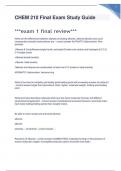
-
CHEM 210 Final Exam Study Guide Graded A+
- Exam (elaborations) • 24 pages • 2023
-
- $13.49
- + learn more
CHEM 210 Final Exam Study Guide ***exam 1 final review*** What are the differences between aliphatic (including alkanes, alkenes,alkynes and cyclic compounds) aromatic hydrocarbons are. - correct answer ALIPHATIC Hydrocarbon: Non- aromatic -Alkanes & CycloAlkanes:single bonds; saturated:Contain only carbon and hydrogen & C-C & C-H single bonds -Alkenes:double bond(s) -Alkynes: triple bond(s) *alkenes and alkynes are unsaturated: at least one C-C double or triple bond(s) AROMATIC H...
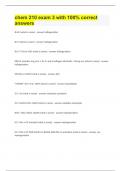
-
CHEM 210- EXAM 1- CHAPTERS 10, 11, 12, 13, and 14 + QUIZZES /PP QUESTIONS AND ANSWERS
- Exam (elaborations) • 2 pages • 2023
-
Available in package deal
-
- $14.99
- + learn more
Choose the most CORRECT property of an organic compound. A) low boiling point B) high melting point C) conducts current D) flammable E) A and D Answer: E) A and D A) Low boiling point AND D) Flammable Which of the following compounds will have double bond(s) in it? A) octane B) heptyne C) benzene D) A and C E) A and B Answer: D) A)Octane AND C)Benzene What is the molecular formula of cyclohexane? A) C6H8 B) C6H12 C) C6H10 D) C6H14 Answer: B) C6H12 ...
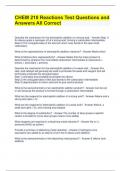
-
CHEM 210 Reactions Test Questions and Answers All Correct
- Exam (elaborations) • 3 pages • 2024
-
Available in package deal
-
- $8.49
- + learn more
CHEM 210 Reactions Test Questions and Answers All Correct Describe the mechanism for the electrophilic addition of a strong acid. - Answer-Step 1) An alkene grabs a hydrogen off of a strong acid, forming a carbocation intermediate. Step 2) The conjugate base of the acid (an anion now) bonds to the open shell carbocation What is the regioselectivity of electrophilic addition reactions? - Answer-Markovnikov What is Markovnikov regioselectivity? - Answer-States that the major product is d...
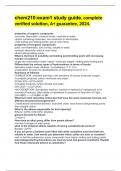
-
chem210:exam1 study guide, complete verified solution, A+ guarantee, 2024.
- Exam (elaborations) • 6 pages • 2024
-
- $11.79
- + learn more
chem210:exam1 study guide, complete verified solution, A+ guarantee, 2024. properties of organic compounds non-polar; flammable; covalent bonds; insoluble in water; carbon containing molecules; non-conductor in electrolytes; LOW boiling and melting points; gas at room temp. properties of inorganic compounds polar; non-flammable; ionic bonds; soluble in water; conducts electricity; solid at room temp; HIGH boiling/melting points What is the trend in solubility and boiling point/melting...
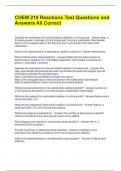
-
CHEM 210 Reactions Test Questions and Answers All Correct
- Exam (elaborations) • 3 pages • 2024
- Available in package deal
-
- $8.49
- + learn more
CHEM 210 Reactions Test Questions and Answers All Correct Describe the mechanism for the electrophilic addition of a strong acid. - Answer-Step 1) An alkene grabs a hydrogen off of a strong acid, forming a carbocation intermediate. Step 2) The conjugate base of the acid (an anion now) bonds to the open shell carbocation What is the regioselectivity of electrophilic addition reactions? - Answer-Markovnikov What is Markovnikov regioselectivity? - Answer-States that the major product is d...
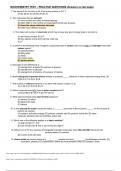
-
Canada College BIOL BTN445 BIOCHEMISTRY TEST – 2024 QUESTIONS (Answers on last page)
- Exam (elaborations) • 4 pages • 2024
-
- $12.49
- + learn more
BIOCHEMISTRY TEST – QUESTIONS (Answers on last page) 1. The atomic # for Fe (iron) is 26. How many protons in Fe2+? (A) 22 (B) 24 (C) 26 (D) 28 (E) 30 2. Two molecules that are isomers: (A) must contain the same functional groups (B) often differ in the number of unsaturated bonds they possess (C) have the same molecular formulas (D) often have different masses 3. The maximum number of electrons which may occupy any given energy level in an atom is: (A) the Group number (D) 2n2 (B) ...
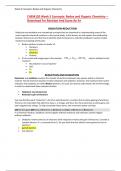
-
CHEM120 Week 5 Concepts: Redox and Organic Chemistry – Download For Revision And Score An A+
- Other • 16 pages • 2024
-
Available in package deal
-
- $15.49
- + learn more
CHEM120 Week 5 Concepts: Redox and Organic Chemistry – Download For Revision And Score An A+ OXIDATION-REDUCTION Reduction and oxidation are intertwined concepts that are important to understand ing some of the most important chemical reactions in the human body. In this lesson, we will explore the relationship between these terms and the how to identify what chemicals in a reduction/oxidation reaction (redox reaction) are playing which parts. 1. Redox reactions involve a transfer of: ▪ Nucl...
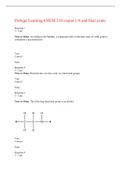
-
Portage Learning CHEM 210 exams 1-8 and final exam
- Exam (elaborations) • 124 pages • 2022
-
- $18.49
- 5x sold
- + learn more
Portage Learning CHEM 210 exams 1-8 and final exam Question 1 3 / 3 pts True or False: According to the Module, a compound with a molecular mass of 1,000 g/mol is considered a macromolecule. True Correct! False Question 2 3 / 3 pts True or False: Biomolecules can have only two functional groups. True Correct! False Question 3 3 / 3 pts True or False: The following functional group is an alcohol. True Correct! False Question 4 3 / 3 pts True or False: In ...
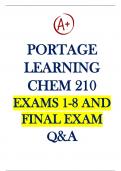
-
Portage Learning CHEM 210 exams 1-8 and final exam with complete solution
- Exam (elaborations) • 125 pages • 2024
-
- $14.99
- + learn more
Portage Learning CHEM 210 exams 1-8 and final exam Question 1 3 / 3 pts True or False: According to the Module, a compound with a molecular mass of 1,000 g/mol is considered a macromolecule. True Correct! False Question 2 3 / 3 pts True or False: Biomolecules can have only two functional groups. True Correct! False Question 3 3 / 3 pts True or False: The following functional group is an alcohol. True Correct! False Question 4 3 / 3 pts True or False: In a eukaryotic cell, the organelles called p...
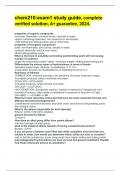
-
chem210:exam1 study guide, complete verified solution, A+ guarantee, 2024.
- Summary • 6 pages • 2024
-
- $10.49
- + learn more
chem210:exam1 study guide, complete verified solution, A+ guarantee, 2024. properties of organic compounds non-polar; flammable; covalent bonds; insoluble in water; carbon containing molecules; non-conductor in electrolytes; LOW boiling and melting points; gas at room temp. properties of inorganic compounds polar; non-flammable; ionic bonds; soluble in water; conducts electricity; solid at room temp; HIGH boiling/melting points What is the trend in solubility and boiling point/melting...

Did you know that on average a seller on Stuvia earns $82 per month selling study resources? Hmm, hint, hint. Discover all about earning on Stuvia


